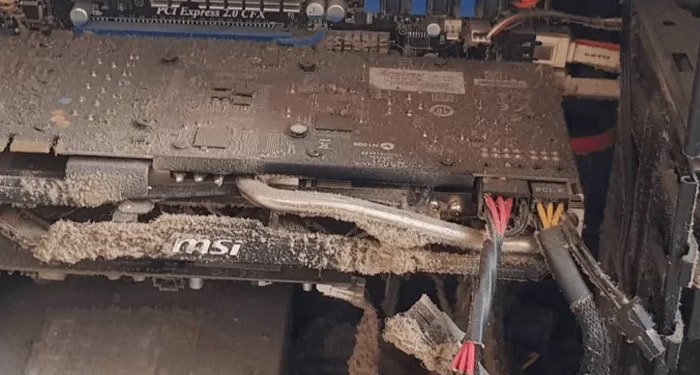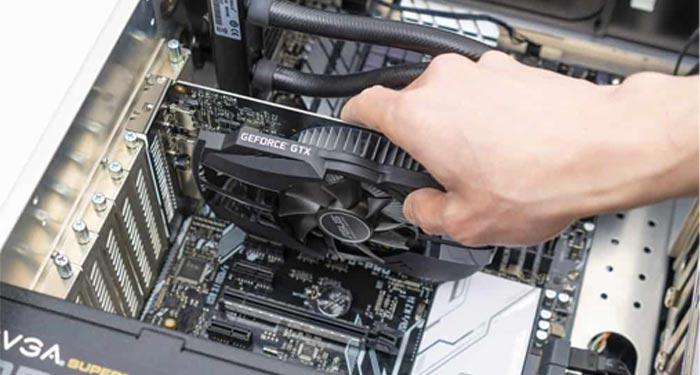If your GPU constantly crashes during load, it might signal more troublesome issues, but most often, it’s just a manner of cleaning your PC or switching up a few software changes. In this article, we will give you the top causes for GPU crashes, how to fix them, and how to prevent your GPU from ever suddenly dying.
Why is my GPU Keeps Crashing?
How to Fix When GPU Keeps Crashing?
The way to approach GPU crashes is to isolate the exact issue that you are having and focus on troubleshooting it. We will show you both general fixes that might work for most cases, but also give you more specific troubleshooting for exact scenarios.
Colorful Artifacts are appearing: For this one, the most likely cause is either too generous overclocking or a GPU nearing the end of its life span. In some cases, outdated drivers can also cause artifacts. Sudden black screen: Sudden crashes are most commonly caused by overheating or corrupt system files. Missing/ flickering textures: This one is either due to faulty game files or overclocking. Screen powers off: If your screen powers off, the issue might be within the GPU connector cables or the power supply. Crashing/ Sudden blue screen: This is the most common symptom, especially when your GPU is under heavy load.
It’s important to remember that isolated instances of GPU crashes are not always indicative of an underlying issue, and could simply be related to the game or application encountering an error. Persistent GPU crashes and low performance on the other hand imply a common recurring issue.
Remove Overclocking
The first thing you should do before attempting any other troubleshooting is to remove any current overclocks on your GPU. Overclocking is generally a safe and easy way to gain slight FPS increases. Still, suppose you overdo the overclock on either the GPU core or memory speed. In that case, it might cause crashes of different kinds, from blue screens to texture flickering and artifacts on your screen. It’s best to set your GPU’s core and memory clock speeds to their default values and remove any boost clock that locks your GPU at a specific frequency during all times. If your PC is frozen and you can’t access your third-party overclocking software, restart your PC manually by holding the power button until it continues. Once your PC resets, the default GPU frequency should be applied. This applies to any voltage changes that you used to the GPU as well, so please reset them to the default value if applicable.
Update Drivers
Any outdated GPU drivers can be incredibly detrimental to performance and stability and can undoubtedly be the cause of a variety of different types of GPU crashes. Always keep your GPU drivers up to date since they not only often offer noticeable performance gains and feature integrations but also add better stability and consistency. Here is how to manually update your GPU drivers: An alternative way to automatically keep all your GPU drivers up to date is to install either NVIDIA’s GeForce Experience or the AMD equivalent. These applications will automatically scan and update your GPU to the latest drivers, so you won’t have to worry about having driver-related crashes ever again. While you are updating drivers, it’s also a great idea to update all of your other PC’s drivers.
Faulty Power Supply
A faulty power supply might cause sudden PC crashes that you might falsely blame on your GPU. The most common scenario is, suppose your PSU is defective, but your PC still boots up. When you open up a graphically intense game or application, your GPU starts drawing its max power. Still, the PSU can’t handle it, so it crashes instead to prevent hardware damage. The only way to check if this is the case is to swap your PSU for a different one and see if your PC still crashes under heavy graphic load.
Prevent GPU Overheating/ Dust Off Your PC
This is, without a doubt, the most common issue related to PC performance since every single PC user will face it at one point. Do you notice that your system is incredibly loud, even at a small load, or if your PC slows down to a crawl when you use it for longer than a few minutes? It’s almost guaranteed that your PC’s internal components’ temperatures are too high. The reason why most GPUs crash is to prevent hardware damage from overheating. Think about it; if your PC case is full of Dust, your GPU fans struggle to get cool air to disperse the immense heat from the GPU core and memory. Then your GPU will either underclock significantly or enter an emergency shutdown to prevent overheating. The fix here is straightforward and should be performed every few months, depending on how dusty the area of your PC is. Once your PC has been cleaned internally, then connect all the cables back and check if the GPU crashing persists. In some cases, if your PC is clean, but you are obstructing airflow (putting the laptop on top of your bed sheath) can cause restricted airflow. So be mindful that your PC’s intake fans are unobstructed.
Update Your DirectX
DirectX is a combination of various APIs that are made to render, display, and calculate 3D images, textures, and anything graphics related. Most games rely on DirectX software to run correctly. In case your DirectX is the wrong version or outdated, you could be faced with sudden crashes when you open up or play certain games. Updating and checking your DirectX version is not very straightforward, but don’t be scared. We have an entire article on how to update DirectX.
Replace Your GPU
If your GPU has been running for a few long years, or if you bought it second-hand, it will likely malfunction as time goes on like any other hardware component. GPUs, unlike RAM, for example, are subject to very high temperatures, so their parts, such as the VRAM or the capacitors, become damaged with time. As this process continues, you might start noticing sudden crashes, blue screens, or screen artifacts during GPU use. The only fix is to replace your GPU or return it for a new one. If your GPU is still under warranty, check with the manufacturer for replacement. Remember that no hardware is bulletproof, so even new GPUs can sometimes malfunction shortly after being used.






title: “Does Your Gpu Keep Crashing Here S How To Fix It” ShowToc: true date: “2022-12-21” author: “Coleen Garner”
If your GPU constantly crashes during load, it might signal more troublesome issues, but most often, it’s just a manner of cleaning your PC or switching up a few software changes. In this article, we will give you the top causes for GPU crashes, how to fix them, and how to prevent your GPU from ever suddenly dying.
Why is my GPU Keeps Crashing?
How to Fix When GPU Keeps Crashing?
The way to approach GPU crashes is to isolate the exact issue that you are having and focus on troubleshooting it. We will show you both general fixes that might work for most cases, but also give you more specific troubleshooting for exact scenarios.
Colorful Artifacts are appearing: For this one, the most likely cause is either too generous overclocking or a GPU nearing the end of its life span. In some cases, outdated drivers can also cause artifacts. Sudden black screen: Sudden crashes are most commonly caused by overheating or corrupt system files. Missing/ flickering textures: This one is either due to faulty game files or overclocking. Screen powers off: If your screen powers off, the issue might be within the GPU connector cables or the power supply. Crashing/ Sudden blue screen: This is the most common symptom, especially when your GPU is under heavy load.
It’s important to remember that isolated instances of GPU crashes are not always indicative of an underlying issue, and could simply be related to the game or application encountering an error. Persistent GPU crashes and low performance on the other hand imply a common recurring issue.
Remove Overclocking
The first thing you should do before attempting any other troubleshooting is to remove any current overclocks on your GPU. Overclocking is generally a safe and easy way to gain slight FPS increases. Still, suppose you overdo the overclock on either the GPU core or memory speed. In that case, it might cause crashes of different kinds, from blue screens to texture flickering and artifacts on your screen. It’s best to set your GPU’s core and memory clock speeds to their default values and remove any boost clock that locks your GPU at a specific frequency during all times. If your PC is frozen and you can’t access your third-party overclocking software, restart your PC manually by holding the power button until it continues. Once your PC resets, the default GPU frequency should be applied. This applies to any voltage changes that you used to the GPU as well, so please reset them to the default value if applicable.
Update Drivers
Any outdated GPU drivers can be incredibly detrimental to performance and stability and can undoubtedly be the cause of a variety of different types of GPU crashes. Always keep your GPU drivers up to date since they not only often offer noticeable performance gains and feature integrations but also add better stability and consistency. Here is how to manually update your GPU drivers: An alternative way to automatically keep all your GPU drivers up to date is to install either NVIDIA’s GeForce Experience or the AMD equivalent. These applications will automatically scan and update your GPU to the latest drivers, so you won’t have to worry about having driver-related crashes ever again. While you are updating drivers, it’s also a great idea to update all of your other PC’s drivers.
Faulty Power Supply
A faulty power supply might cause sudden PC crashes that you might falsely blame on your GPU. The most common scenario is, suppose your PSU is defective, but your PC still boots up. When you open up a graphically intense game or application, your GPU starts drawing its max power. Still, the PSU can’t handle it, so it crashes instead to prevent hardware damage. The only way to check if this is the case is to swap your PSU for a different one and see if your PC still crashes under heavy graphic load.
Prevent GPU Overheating/ Dust Off Your PC
This is, without a doubt, the most common issue related to PC performance since every single PC user will face it at one point. Do you notice that your system is incredibly loud, even at a small load, or if your PC slows down to a crawl when you use it for longer than a few minutes? It’s almost guaranteed that your PC’s internal components’ temperatures are too high. The reason why most GPUs crash is to prevent hardware damage from overheating. Think about it; if your PC case is full of Dust, your GPU fans struggle to get cool air to disperse the immense heat from the GPU core and memory. Then your GPU will either underclock significantly or enter an emergency shutdown to prevent overheating. The fix here is straightforward and should be performed every few months, depending on how dusty the area of your PC is. Once your PC has been cleaned internally, then connect all the cables back and check if the GPU crashing persists. In some cases, if your PC is clean, but you are obstructing airflow (putting the laptop on top of your bed sheath) can cause restricted airflow. So be mindful that your PC’s intake fans are unobstructed.
Update Your DirectX
DirectX is a combination of various APIs that are made to render, display, and calculate 3D images, textures, and anything graphics related. Most games rely on DirectX software to run correctly. In case your DirectX is the wrong version or outdated, you could be faced with sudden crashes when you open up or play certain games. Updating and checking your DirectX version is not very straightforward, but don’t be scared. We have an entire article on how to update DirectX.
Replace Your GPU
If your GPU has been running for a few long years, or if you bought it second-hand, it will likely malfunction as time goes on like any other hardware component. GPUs, unlike RAM, for example, are subject to very high temperatures, so their parts, such as the VRAM or the capacitors, become damaged with time. As this process continues, you might start noticing sudden crashes, blue screens, or screen artifacts during GPU use. The only fix is to replace your GPU or return it for a new one. If your GPU is still under warranty, check with the manufacturer for replacement. Remember that no hardware is bulletproof, so even new GPUs can sometimes malfunction shortly after being used.





